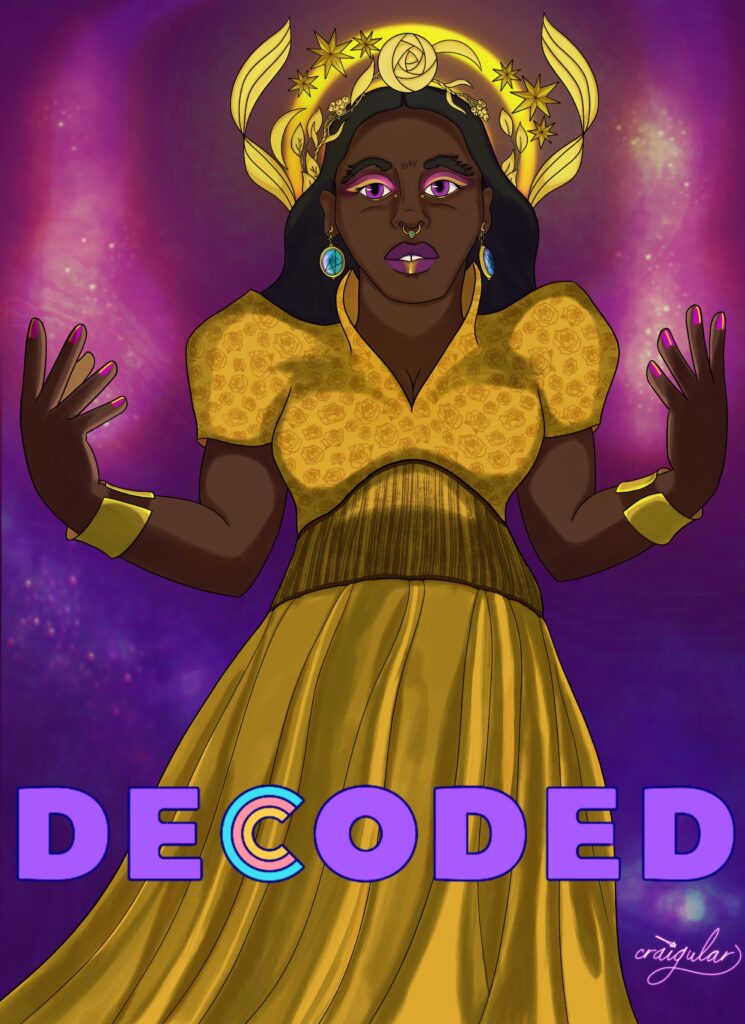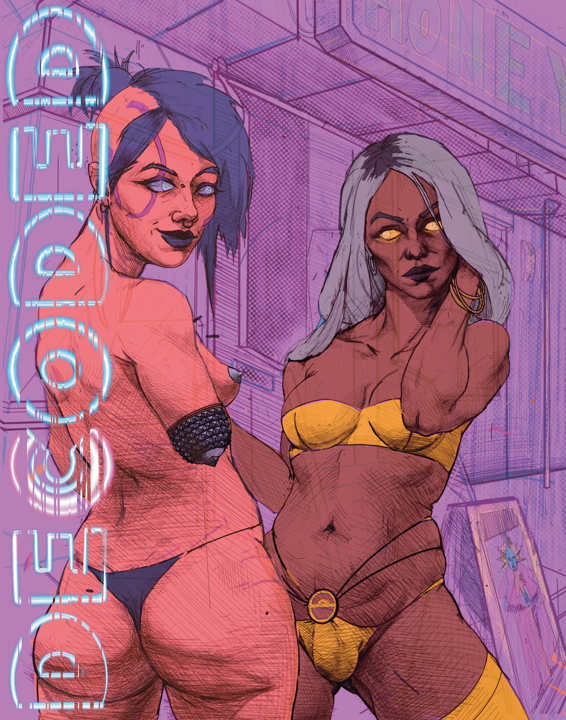by Tina Horn
Every generation thinks they have it more terrifying than the last (until we successfully cruise utopia, one assumes). But this era is real bad for queer creators laboring under late capitalism, amiright? It’s not paranoia if they’re really out to get us, yeah? Either you pitch yourself endlessly on spec (that means “zero guarantee of money” for all you fans reading out there) to company men answering to billionaires, who all know it’s in their best interest to virtue signal by slapping a rainbow on their products in June while acting in terror of actual queer stories/people every month of the year including and not limited to June … or you can go indie/DIY, which these days involves crowdfunding directly with (mostly absolutely lovely) fans, navigating tricky parasocial relationships and online work-life boundaries and expectations that you are a one person creator-marketer-designer-accountant-IT-guy-customer-service-agent delivering at the inhuman pace of previously mentioned megacorps. And all of these binds make it ever more difficult, more exhausting, to tell the really weird stories.

And we need it. The weirdness. We need it like we need oxygen and water. Weirdness is elemental to queers. Weirdo stories are queerdo stories. Our imaginations are prismatic by design and post-structural by necessity. We need our imaginations in order to survive and hide, to fight, fly, and fawn, to rest and digest even! Whether it’s nature or nurture, we observe and catalog the meta-process of personhood just by being ourselves. The scales have fallen from our eyes, if they were ever there at all.
Weirdo stories are queerdo stories. Our imaginations are prismatic by design and post-structural by necessity. We need our imaginations in order to survive and hide, to fight, fly, and fawn, to rest and digest even!
We love horror, science fiction, fantasy, pulp, B-movies, comic books, slash fiction, broad comedy, porno, all the exquisite trash you’ll find in Decoded Pride, because indignant difference resonates in our nature. We do not believe that traditionalist narrative structures will fulfill our desires so we bend and twist and riff and cut up and collage. Queerness is a matter of scale, of perspective. Queerness is unstuck in time. Queerness is outer and inner and inter space. Queerness is a quantum level and leap. Queerness is quests and consumption and outsider care. Of course we are gore whores and space cadets. Of course we have the best Halloween costumes. Of course we have other worlds incubating inside of us threatening to burst out of our chests. Our bodies, our language, our lust, our love is malleable, so of course you’ll find us at comic cons and RPG meet ups, at anarchist infoshops and 1 a.m. drag shows, dreaming ourselves into the future.
That’s why projects like Decoded Pride are so essential. Decoded Pride is a novel idea for our times: serializing stories designed to be time released. It’s both forward-thinking and old-fashioned, practically Dickensian and also utopian. In an era of 24/7 news cycles and the demand for our vacation pictures to be part of the professional content mill, consensual restraint and creative anticipation are a gift. Even if you’re reading this long after June 2022, the immediacy, the tension of the stories being released in real time will always exist in this anthology. These ingenious editors — Sara Century, Monika Estrella Negra, and S.E. Fleenor, as well as copyeditor Priya Saxena — have fashioned something outside the constraints of linear time and space, of consumer structure, of financial hierarchies. And they’ve curated a fantastic collection of minds and hearts and other parts, because queers have the best taste in everything, people most of all.
Not all of the characters or content in Decoded Pride are explicitly LGBTQIA+ in the ways you might expect: but the creators are, in a multitude of manifestations. Because queerness is a sensibility. You may notice there’s not a lot of coming out stories here, not a lot of bisexual experiments or gender reveals. That’s something we don’t talk about enough when it comes to representation. Yes, we need queer heroes and villains and love epics and sex scenes and chosen families yes yes yes. But the thing about fictional characters is that they’re not the ones to get paid or score a life-changing byline. They’re not the ones who have to beg and plead to tell the stories they want and need to tell, the ones who are asked to shave off the rough edges, trim the fat, define their terms. We are the nonfiction. We exist in this timeloop, this dimension, and most of us have massive bills (not to mention egos)! Our stories are queer whether we conjure a queer tragedy or not. Our stories are gender non-conforming because that’s how we think and how we dream. You, the reader, are proving the value in such a space by reading these words.
When we read, we care for one another. When we smash that subscribe button, we build new worlds. When we collect, we move faster than the structures of power. We walk through walls, we shift through dimensions, we glamour your minds. Every magical power ever canonized in story is just a metaphor for a quality some queer person has, and has to learn how to wield.

There’s lots of ways to queer a story’s themes. Orienting us in a robot’s point of view, as in Katlina Sommerberg’s “WE ARE ROBOT.” Queerness as alien parasite that can be suppressed but never truly extricated (“Parasite” by Callie Cameron). Queerness as flesh-eating monster that might kill you while it fucks you — even if the living sex is disappointingly vanilla at first (a standout tragedy called “Devour Me” by Sarah Edmonds). An aromantic mechanic who harbors renegades (“Kitty’s Gas Station” by Avra Margariti). Empathy for the dead (“These Whispering Remains” by Izzy Wasserstein).
Somehow, it’s queer when the apartment your ex wants to you to come over to in order to hash things out and pick up your stuff isn’t an apartment at all, but a spaceship. (The hilarious “Platinum Venus” by Illimani Ferreira, in which the emotional absurdity of hanging out with your ex is perfectly matched by the circumstances of interstellar adventure).
And then of course you have camp directness in the form of “Punk Rock Lesbians from Beyond the Grave” by Darci Meadows, a tale of Christian hypocrisy and the immortal power of teen rebellion in which punks (spoiler alert!) win again. Same goes for the comic “The Agents of CLAW Save Christmas” by Jeffrey Brown, a hilarious comic that somehow manages to make Santa into a fascist that needs to be punched. Can’t you just see these titles on the marquee of a midnight movie double feature glowing over the heads of fabulous queer goths lined up around the block?
Finally: not everyone here is a hero. In these stories, we have first person protagonists behaving badly, toxically even (most notably in “Invidia” by Christina Wilder).
What could be queerer than that?
Psst! You can still buy a subscription to Decoded Pride Issue #3 for only $14.99 and know you’re supporting indie queer and trans art!
Tina Horn is the host/producer of Why Are People Into That?!, a podcast about sex, kink, gender & love; the writer/creator of sci-fi sex rebel comic book series SFSX; and the author of many books and articles on underground sexual politics and culture. She’s a consultant for entertainment, politics, and literature, a diehard queer punk, and a true karaoke believer. tinahorn.net/
Craig Hale (they/them) is a multi-hyphenate and avid overconsumer of media including film, television, music, ttrpgs, comics, fantasy, sci-fi, and speculative fiction. At times they even find the time and energy to write, podcast, and create art of their own! From the stage to the page – a passion for stories, how they’re told, and by whom has been the lens through which Craig has viewed and critiqued the world around them. This has been most evident in the film review and appreciation podcast they produce and co-host, “I Want You to Watch This.”
Sinead Murano-Kinney is an all around feral trans femme who sometimes makes comics, or writes about them but is generally just trying to do the best work she can for the trans community.

